Exceptional & Extraordinary
Unruly bodies and minds in the medical museum

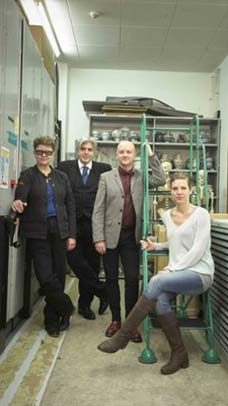 Since humans first appeared on Earth no two have ever been the same. Yet somewhere along the way, certain bodies and minds came to be highly valued whilst others became viewed as problematic; as deviant and unruly, deficient and requiring adjustment towards a perceived idealised norm.
Since humans first appeared on Earth no two have ever been the same. Yet somewhere along the way, certain bodies and minds came to be highly valued whilst others became viewed as problematic; as deviant and unruly, deficient and requiring adjustment towards a perceived idealised norm.
Exceptional & Extraordinary invites four artists to explore behind the scenes of eight of the UK's most renowned medical museums and - in collaboration with experts in medical history, disability and museums - to produce a series of thought-provoking new commissions that examine our attitudes towards difference and aim to stimulate debate around the implications of a society that values some lives more than others.
Exceptional & Extraordinary is an RCMG-initiated project led by Richard Sandell and Jocelyn Dodd.
Summary
Exceptional & Extraordinary has commissioned four disabled artists to create four emotionally powerful, impactful, provocative and high-quality artworks – comprising comedy, dance, live performance, film and digital media – arising from a collaboration between artists, medical museums, their collections and associated stories, curators, historians, researchers, and public and media engagement specialists.
These performances - which will tour to eight partner museums throughout June 2016 - offer new ways of seeing and thinking about the cultural, social and ethical implications of medicalised ways of understanding bodily and mental differences as inherently problematic, deviant and in need of a fix or cure. They will stimulate and inform public debate, capture the public imagination and media attention, engage and provoke, open minds and enable dialogue around a relevant and pressing, but largely overlooked, social issue – how we think about, respond to and treat people with physical and mental differences.
Exceptional & Extraordinary is a collaborative project initiated and led by RCMG in partnership with 4 artists – Francesca Martinez, Julie McNamara, David Hevey and Deaf Men Dancing - and 8 medical museums whose collections, expertise and stories lie at the heart of the project.
Exceptional & Extraordinary is funded by the Wellcome Trust and Arts Council England.


Aims and objectives
The aim of Exceptional & Extraordinary is to stimulate public and professional debate around an increasingly important and contested social issue – our individual and societal attitudes towards disabled people and the ways we think about, respond to, and treat people with physical and mental differences. The project objectives are to:
- Build an interdisciplinary community of practice and foster a productive process of collaboration between artists and museum partners;
- Produce 4 major artworks that will offer new ways of seeing and thinking about bodily and mental difference;
- Stimulate dialogue and inform public debate;
- Extend reach and public debate through mainstream and specialist media;
- Prompt discussion and reflection amongst medical practitioners.
The artists
Exceptional & Extraordinary brings together four highly acclaimed and high profile artists - comedian Francesca Martinez, documentary film-maker David Hevey, playwright Julie McNamara and live performers Deaf Men Dancing - to explore the role that medicalised perspectives on bodily and mental difference have played in shaping and reinforcing society’s attitudes towards disability.
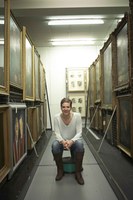
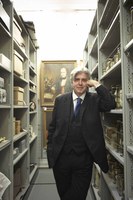
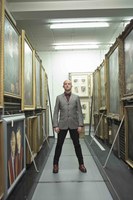
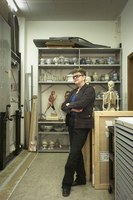
The artists have been carefully selected to collectively draw on their diverse personal experiences of disability to produce work that, although hugely variable in content and style, has in common a deep understanding of the relationship between disability and medicine and a commitment to challenge deeply entrenched negative attitudes towards disabled people.
Museum partners
Medical museums, their collections, expertise and the stories they hold, lie at the heart of this project. Within medical collections, disabled people have often been the exceptions that prove the rule, presented in reductive and dehumanising ways that underpin negative ideas about what and who is deemed different, deviant and problematic. Within Exceptional & Extraordinary, eight medical museums offer productive sites for exploring the relationship between medicine and attitudes towards disabled people, and will act as powerful venues for performances and debates around issues that affect us all but which have received limited public and media attention. The eight partner museums are:
- Hunterian Museum, Royal College of Surgeons, London
- Royal College of Physicians Museum, London
- Science Museum, London
- Royal London Hospital Museum and Archive, London
- Langdon Down Museum of Learning Disability, Normansfield, Middlesex
- Bethlem Museum of the Mind, Beckenham, Kent
- Thackray Medical Museum, Leeds
- Surgeons' Hall Museum, Royal College of Surgeons, Edinburgh
These museums have been chosen for the specific medical, historical and ethical expertise, and will enable the artists to draw on collections, objects and stories which speak to a broad range of disabled peoples’ experiences. The museum partners share a concern to use their collections in new ways that will enhance their relevance, broaden their appeal for new audiences, and equip them to engage audiences in debating contemporary, and challenging, social and scientific issues.
Project advisors
- Dr Sam Alberti, Director, Hunterian Museum
- Tony Heaton OBE, CEO Shape Arts
- Dr Katherine Ott, Curator, Division of Medicine and Science, National Museum of American History, Smithsonian Institution
Project process
Exceptional & Extraordinary will create four, emotionally impactful, provocative and high quality artworks from a potent blend of highly trusted museum and medical expertise, museums objects and their associated stories, and highly personalised and politically engaged perspectives on the lived experience of disability.
A series of structured exchanges and interactions between the artists and participating experts will be used to both generate and test ideas for the content and format of the performances, and identify any emerging ethical issues e.g. disabled and non-disabled audience responses to potentially sensitive material.
Collections investigations
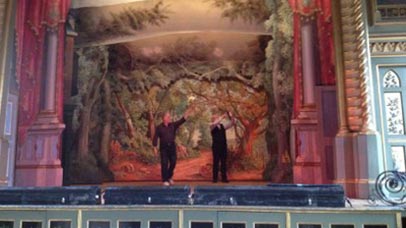
To develop their artworks, the artists made a series of visits to selected museums to talk with curators - drawing on their knowledge to research the collections for relevant objects, histories and stories - and review existing displays.
The visits revealed a wealth of objects, documents and even spaces (including the amazing 19th century theatre at Langdon Down, above) that have helped to inspire, illuminate and intrigue the artists as they start to develop their performances.
David Hevey explores the stores at the Royal College of Surgeons (below, left) and the Royal College of Physicians (below, right)
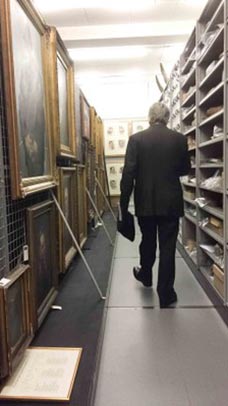
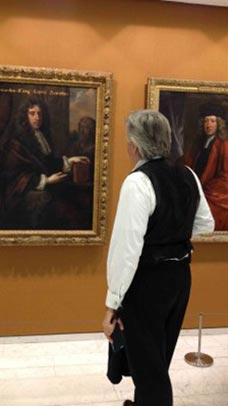
Below: Francesca Martinez looks at the collections at the Royal College of Physicians with Emma Shepley and Kevin Hely.
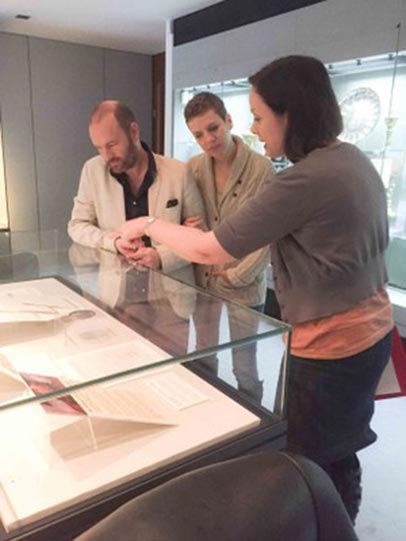
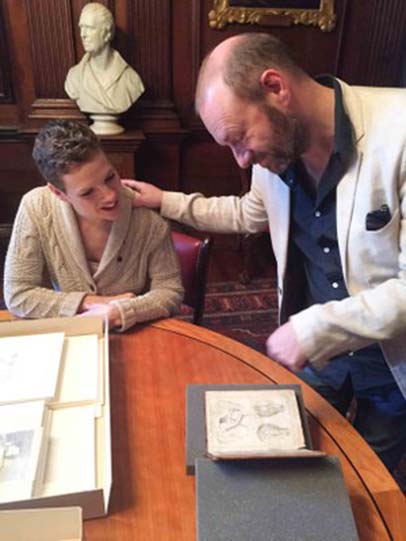
Julie McNamara examines paintings and documents in the collections at Bethlem, Museum of the Mind
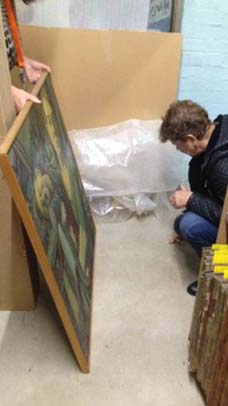
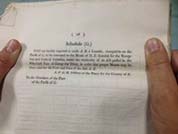
Mark Smith with a selection of hearing aids at the Thackray Medical Museum
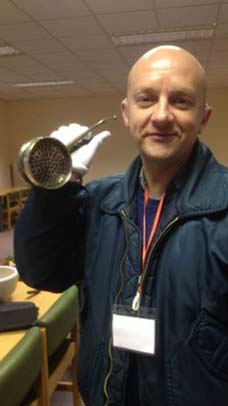
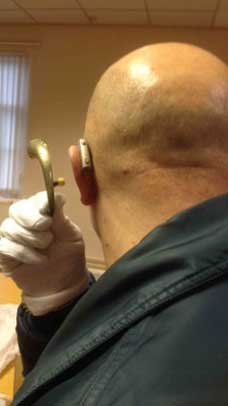
Creative development and production
Artists will develop their ideas for the content and format of the artworks, agreeing their final texts and scripts in collaboration with RCMG and the project producer.
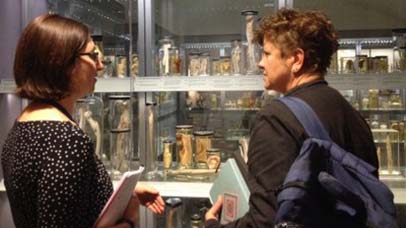
The performances
The artworks commissioned from the four artists toured throughout June 2016 to all eight partner museums in a series of performances, building on the highly successful Cabinet of Curiosities: How Disability was kept in a box by Mat Fraser, which won the Observer Ethical Awards for Arts and Culture 2014. The performances will be aimed at new and existing adult museum visitors, medical practitioners, trainees and students, and arts/medicine/museum-interested publics.
Pre and post performance discussions and events will engage audiences in debate and open up dialogues around challenging issues to do with mental and physical difference. Online forums and a dedicated Twitter campaign (@UnrulyBodies) will provide opportunities for participating audiences to share their thoughts with artists, organisations and fellow audience members. UK media coverage (print, broadcast and social media) will be used to extend the reach and engagement of the performances.
An evaluation will capture the impact of this public engagement - as well as the themes and topics discussed by the media coverage of the performances – and will be made available on RCMG’s website.
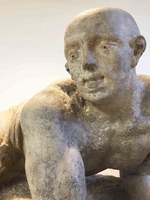
Engaging medical practitioners
The artworks will be used to develop a pilot initiative or suite of resources that can be used with trainee doctors to prompt reflection and discussion around patient-centred approaches and related ethical issues.
For more information about the Exceptional & Extraordinary project please visit the project website.